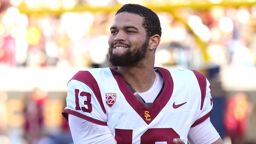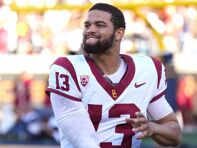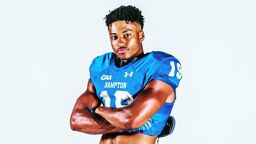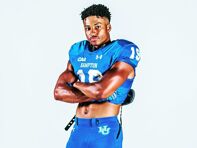It had been months since Alan Gendreau put on a pair of cleats and stood three yards behind a football. The former Middle Tennessee State placekicker had all but left the game behind when he graduated a year ago.
Yet there he was on a Saturday morning in early April lining up for a kick, the sun beating down on the bright green field as the wind swirled around him. A half-hearted attempt to make it to the NFL was in his past; the crush of a disappointing senior season, punctuating a stellar college career, had been put in his distant memory. Now with renewed purpose, Gendreau had made a potentially game-changing decision: It’s time for him to shoot for the stars again.
After a brief instruction on how I should hold the ball for him, Gendreau looked up from his backward steps and focused downfield.
"I always focus on a spot past the goal post," he said as he readied for his first kick. "Gotta aim further than I’m trying to go."
With a deep breath, arms outstretched, and one last stare past the goal posts 40 yards away, he took three steps toward the ball and let his foot fly. The connection lifted the ball soaring, passing through the uprights and finally hitting the track 20 yards past the field, bouncing high over the distant fence.
Gendreau stood there beaming.
"That felt real good," he said. "Let’s back up 10."
Over the next half hour, he nailed field goal after field goal, clearing the crossbar with plenty of distance to spare every time despite standing up to 55 yards away. As the wind picked up and drove sideways across the field, he adjusted his aim, letting the crosswind guide the ball for another goal.
When he was done, he’d connected on all but two attempts.
"Tell me again why you walked away from football?" I asked.
He kicked the grass, processing his performance, his head down almost embarrassed by the question.
"I don’t know," he finally said. "But now I’ve got to walk back in."
—–
Gendreau had a record-breaking career at Middle Tennessee State.
With a PAT in his final game as a Blue Raider, he became the all-time leading scorer in Sun Belt Conference history with 295 points. His longest field goal in college, at 55 yards, was the second-longest ever in the conference. That was 12 yards short of the 67-yard field goals he connected on during team practices; it was even shorter than field goals he kicked in high school.
In his sophomore and junior years, he was 28-of-34 for an 82-percent conversion rate. In 2009, he was a national semifinalist for the Lou Groza Award that honors the top college place-kicker in the U.S.
Gendreau had a tendency to convert when the team needed it most. In a big match-up at Maryland early in his sophomore year, he hit a 19-yard field goal from a badly angled left hash mark with no time left to lift his team to a huge road win. It prompted the team chaplain to nickname him "Ice," a moniker the kicker carried the rest of his college days.
His career kickoff average was only 57 yards, but Gendreau said that was due to his coach’s mandate to "pooch" most kickoffs. Given his ability to hit 67-yard field goals, and his performance that Saturday drilling the ball well over 60 yards, his explanation makes sense. He also has some speed for a kicker, logging a 4.95-second 40 time at his pro day; he recorded three tackles on kickoffs at MTSU.
After his third year, he was headed straight for a shot at the NFL.
Trouble started the first game of his senior season, in a big match-up at Purdue. His first attempt of the season was blocked when protection broke down and a defender came straight through the middle of the line. But it was the second blocked kick that lingered in his mind. With five seconds remaining in the same game, down 27-24, a defender broke through from the corner to prevent overtime.
"I was so ready to start my big push for the pros," Gendreau said. "And I connected with the ball perfectly on those kicks. They were going in. But sometimes the protection breaks down. I had great protection for three years, but on those two attempts it broke down. It messed me up for a bit."
While Gendreau was quick to not place blame, saying football is a team sport, his holder and team punter Josh Davis set the record straight: "Those weren't his fault. It was a total breakdown in protection."
Still, those blocked kicks contributed to a 1-for-5 start over the first three games of his important senior season. While he recovered, going 7-for-9 on precious few attempts in his final nine games, the damage was done. Scouting reports heading into the 2012 NFL Draft rated him a middle-of-the-pack kicker.
Hoping to impress scouts and get a shot at the League, he attended the kicking camp of former NFL kicker Michael Husted in San Diego a couple months before the draft.
"I was impressed with him," Husted said, immediately remembering the smiling kid from Tennessee. "From a kicking standpoint I thought he had a lot of talent. He definitely has the potential to kick at the next level."
A couple agents took some early interest in Gendreau, but their follow-up was weak and they disappeared. Given only 62 attempts in his four years with the team — just over one per game — he wasn’t on the radar screens of many NFL teams. Gendreau’s dream of the pros slowly drifted away.
"I didn’t have an agent, and I didn’t know how to get one," Gendreau told me as he longingly watched two men toss the pigskin across the park from where we sat. "I felt stuck. I didn’t know what to do. I’d been competing since I was 3, and I started telling myself I needed a break from competition anyway."
He paused and absorbed the full impact of that decision.
"That was pretty dumb."
—–
I first met Gendreau four years ago when Outsports ran an anonymous story by sociologist Eric Anderson about the gay kicker. Gendreau was a freshman at MTSU at the time, out to his teammates and embraced by them. He didn’t reveal his name publicly at the time because he feared how it would affect both his family and his shot at the NFL.
Now openly gay and 23, with a deep-seated confidence in his sexual orientation, Gendreau wants another shot at the pros. This time, he wants to do it open and honest about who he is. This time, he wants to give it everything he has.
The Orlando, Fla., native knew he was gay at a very young age. He came out to friends and family at 16, started dating boys in high school and had on-again, off-again relationships with men through college.
"When you know, you know," he said with a smile.
Gendreau has also long been a devout Christian, raised in a deeply religious household. It’s a tough mix, being gay and Christian. When he came out to his parents in high school, they put him in church-based counseling. That lasted four sessions.
His sexual orientation collided with his hometown church during the winter break of his freshman year in college. Back home in Orlando for three weeks, Gendreau brought his then-boyfriend to a church gathering with friends from high school.
When parents of other youth got wind that the mystery guest was his boyfriend and Gendreau was gay, they demanded the church leadership remove him from the their worship team. They complied.
"It was like my family telling me I wasn’t allowed to come home."
To this day, Gendreau sleeps with a Bible next to his bed. When he showed it to me in his Washington, D.C. apartment, the first place he turned was the glossary.
"I used to flip to the back to see if the Bible defined homosexuality," he said. His colorful edition from sixth grade has no such entry. In its place are scribbles from Gendreau’s past, including thoughts about being gay and a note about a boyfriend from high school. He still regularly attends Sunday church services.
Religion also played a powerful role on his team at Middle Tennessee State, but with a far different result from his hometown church.
The home of the Blue Raiders is located in Murfreesboro, Tenn., 30 miles south of Nashville. As the name would suggest, it is literally in the middle of Tennessee. A full 82 percent of the state’s population counts themselves as Christian, including almost two-fifths who are Baptist. The city of Murfreesboro was home to the torturous battle over a proposed (and ultimately built) Islamic Center in 2010.
The football team modeled its surrounded community. Bible study was well attended. Religious references were common. The team, like many others, had its own chaplain.
No one on the team cared that Gendreau was gay.
"Everyone just saw him as a football player," Davis said. "He was just one of the guys. The fact that he proved himself on the field, there was a respect for him. He's a good guy. He's a lot of fun to be around. With all the coaches and players, he had a good relationship."
In fact, the first time Josh Davis says he heard of Gendreau was from a teammate who made sure to fill him in on the team’s little secret: "Just so you know, we have a gay kicker." Davis, who is deeply religious and hopes to pursue a career in ministry, wasn’t fazed.
In two years as his teammate, Davis said he never once heard a derogatory comment made about Gendreau’s sexual orientation. Gendreau related the same experience.
"Off the field, some guy might throw a gay joke at him," Davis said, "but it was never intended to be serious, it was just guys being guys together."
Gendreau remembers one of those jokes vividly. During his freshman year, he was hanging out with some of his teammates late one evening when a linebacker observed that something they were all looking at was "so gay." Attention quickly turned to Gendreau.
"Hey man, I’m sorry, I didn’t mean to offend you," the linebacker said.
Gendreau brushed it off.
"Please, I don’t care," he said. "It's all good."
That jovial, carefree attitude endeared him to his teammates off the field. On the field, his performance sealed the deal.
Entering as a freshman with a scholarship, Gendreau was met by two upperclassmen who weren’t keen on the new kid taking their job. Incessant teasing and light hazing, coupled with an effort to ostracize the newbie, didn’t have its intended effect.
"That pressure just made me more determined to win the job and keep it," Gendreau said.
He did just that. His freshman year he was second on the team in scoring (running back Phillip Tanner had an impressive 17 touchdowns and is now with the Dallas Cowboys), connecting on 10 of his 14 field goal attempts. He hit all of his PATs, including an un-timed point to beat Florida Atlantic, and tied the school record with eight consecutive successful field goal attempts.
While some may worry that his sexual orientation would be questioned during his senior season slump, Davis said the team never considered it.
"I don't think his off-the-field lifestyle was questioned about that," Davis said. "It was more a question, ‘What's up with Gendreau? Why isn't he making kicks? Where is he mentally with his game?’ But I never heard anything about him being gay, it was just questions about why he was missing kicks.
"Football was the business, he was an employee and he did his job well," Davis added. "For people who had a relationship with him outside of football, he's a friendly, funny guy. He was just a normal guy. He was a football player."
—–
There has never been a publicly out gay player in the NFL or Division I college football. Only six NFL players — from Dave Kopay in 1975 to Kwame Harris earlier this year — have come out publicly after retiring.
Many experts have long believed the first gay NFL player wouldn’t be a current athlete who comes out. Instead, he would be openly gay in high school and college and eventually make his way into the pros already out of the closet.
If he can make it to the NFL, Gendreau will fit that mold.
"His sexual orientation is not going to matter one bit," said super agent Leigh Steinberg, who has represented the likes of Hall of Famers Warren Moon, Troy Aikman and Thurman Thomas, among others. "The only thing that matters is if he can put that ball between those goal posts. If he can do that, and if he can do it consistently, he’ll have a shot at the NFL."
To get that shot, he has a lot of work to do. By his own estimation, he’s about a month away from being in optimal condition to compete at a tryout. That month will consist of a smart diet and workout regimen. While it’s been a year since he competed, the 5'10 Gendreau has kept himself in top shape, adding several pounds of toned muscle.
It’s already a bit late in the process to aim for a shot this year; some opportunities have been lost. But as one agent told me, it’s not too late if he stays focused and puts in the work.
"Right now, looking back when I’m 40, I can’t say I gave it my best shot," Gendreau said. "I can’t say I really tried to make it into the NFL. Last year I did it half-assed. If I don’t give it everything I have now, I’ll regret it for the rest of my life."
While the NFL Draft is this Thursday, Gendreau went undrafted last year and is a free agent. According to NFL Draft expert Dan Kadar, only two teams — the New York Jets and Carolina Panthers — are likely to draft a kicker this year anyway.
Gendreau’s best shot this season will be to secure an invitation to a team’s organized team activities (OTAs) over the next two months. That invitation could come from a team who attends a workout or sees a video highlighting his skills.
The next opportunity is a training camp in late July or August. Each team has two to three kickers at camp who are either competing for a job or, in the case of a team like the Patriots whose kicking position is locked up by Stephen Gostkowski, are competing for reps to showcase their talent to other teams.
Through all of this, an agent can help. At least one has taken an interest in Gendreau as he attempts his comeback. He's also retained the help of publicist Howard Bragman, who has managed the public coming out of other athletes like Esera Tuaolo and John Amaechi.
If he were a quarterback or a running back or a safety, the idea of him taking a year off from football after college and then getting to the NFL would be a long shot at best. But various sources in the league told me on background that for a kicker — for this one position in football — it’s different.
"It's totally legit that he can get into the league," said Minnesota Vikings punter Chris Kluwe, who has been an outspoken proponent of LGBT rights. "Place-kicking is all about doing this one specific skill set. And if you can do that, you can make it whether you’ve been out of football for one year or 10 years."
Case in point: The Detroit Lions just signed a new kicker, YouTube sensation Havard Rugland from Norway. His only experience kicking footballs before signing was at Husted’s camp for two months earlier this year.
Kluwe pointed out that Gendreau’s college career looks a lot like that of his Vikings teammate, kicker Blair Walsh. Like Gendreau, the former Georgia Bulldog was a four-year starter who had a subpar senior season, connecting on only 60 percent of his field goal attempts. Despite the dip in production, Vikings staff saw potential in Walsh and made him a sixth-round draft pick in 2012. He went on to make the Pro Bowl his rookie year in Minnesota.
"If he does the work, he'll definitely have the opportunity," Gendreau's former college teammate Josh Davis said. "He’s got what it takes. He has the leg."
—–
In many ways, a place-kicker could be the perfect next step for gay visibility in the NFL. It’s the position on a team furthest removed from other players, not part of the offense or defense, but rather the "special" teams unit. A place-kicker only steps on the field for a handful of plays. Some former football players, like former 12-year offensive lineman and current ESPN personality Mark Schlereth, have long taken potshots at kickers, saying they’re not even football players.
"They’re considered screwballs by the pro football establishment," the legendary Paul "Dr. Z" Zimmerman wrote of place-kickers in his "Thinking Man’s Guide to Pro Football. "On TV you might hear CBS’ Pat Summerall say, in his low-key way, ‘Well, they are different.’"
Like a lesbian basketball player, a gay kicker plays to a stereotype. In a sport defined by hard hits and toughness, only on rare occasions — if there’s a broken play — does the kicker hit or get hit. Bill Gramática famously ended his 2001 season with a torn ACL after simply jumping to celebrate a field goal for the Arizona Cardinals.
"We’re a quirky bunch," Husted, the former NFL kicker, admitted.
Gendreau’s personality would be an asset to him in an NFL locker room. Having spent three days with him last weekend and speaking to him over the course of four years, it’s hard not to be taken in by his charm. His constant smile is contagious, his self-deprecating sense of humor endearing. And when he gets into a contest of wits, he can dole out the punishment, and take it with a good laugh.
The fact that he was well liked on his team at Middle Tennessee State, named a game captain several times during his career, speaks well of him. His devout Christianity would also score him points with many potential teammates.
"Most NFL teams are fairly religious in terms of player makeup," Kluwe said. "That's something that can be a way for other guys to identify with him at Bible study or team prayer. They can look at him and see he's like anyone else."
Ultimately, his shot at the NFL will likely come down to whether he can put that ball between those uprights on a consistent basis, and do it with some distance.
"If the guy can kick and he can make the kicks when it counts," Husted said, "that's when everyone loves the kicker no matter who they are. We're either the goat or the hero. So as long as we're the hero, everyone's happy."
—–
The next few months won’t be easy for Gendreau. The timing isn’t great for his hopes of making a team this season, and he still has work to do before he's physically prepared for a tryout. But then again, it’s never easy for anyone to pursue his or her dreams; changing sports culture isn’t accomplished overnight.
What’s heartening to know is that many believe Gendreau’s battle won’t be over his sexual orientation. While the public and the media may not have accepted it yet, the fact is that football — the players and the coaches, the team owners and fans — are overwhelmingly ready to embrace an openly gay athlete in the pros.
"Ten years ago, I would have told you football wasn’t ready for this," Steinberg said. "It would have been ugly. But this generation is different. Even very religious people don’t take it to a personal level. I’ve seen white racists who have no problem with a black person on their team."
What matters most now is Gendreau’s talent and dedication to his craft. While some may clamor for him to become an activist, his most powerful activism will be simply being an athlete: Working out, trying out, suiting up and kicking. How far he’s able to take this — to an NFL tryout, a training camp, a preseason field goal attempt or a roster spot — will hinge heavily on his performance.
"The NFL is a business, and they’re going to make business decisions above all else," openly gay former NFL player Wade Davis said. "They want the best players who can help them win. If this kid can kick 50-yarders consistently, then they’ll have him. But if he can’t, they won’t. Him being gay won’t have anything to do with it."
The one thing holding Gendreau back now is a quiet fear of failure. With his story now public, the hopes of many will rest on this young gay kicker from the South. What if he tries and fails?
It’s a lot of pressure. But kickers are specially designed for it. With the hopes of a stadium full of fans with one second remaining, they’re used to the scrutiny of thunderous cheers and muted jeers. Nicknamed "Ice" by his team chaplain, Gendreau was made for this special, potentially historic, journey.
"All those kids playing sports in the South or anywhere else," Gendreau said, "kids who are afraid to be themselves, I just want to put my arm around them and help them. And if my story can do that, I figure I owe it to them to give it the best ending I can."
—–
You can follow Alan Gendreau on Twitter at @AGendreau38.



































